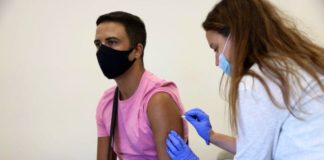
Seventeen legislatures are considering laws that would dictate how medical personnel can treat transgender youth — the latest flash point in the culture war. Arkansas Gov. Asa Hutchinson surprised observers this week when he vetoed one of those bills. It would have outlawed puberty blockers, cross-sex hormone treatment and “gender affirming” surgeries for children.
The Arkansas legislature and 16 others are attempting to big-foot a complex issue. With rare exceptions (such as limitations on assisted suicide and abortion), legislatures are not the best place for decision-making about medical issues. But in our hyper-hysterical culture, it’s becoming less and less possible to engage in these debates where they belong — in the realm of science and journalism. Questions about how best to treat children with gender dysphoria surely belong in the evidence-based world of medical science, psychology and psychiatry, and in the journals, newspapers, books and websites that test ideas for reliability and truth. Jonathan Rauch’s new book, “The Constitution of Knowledge,” is a brilliant meditation on how the mechanisms of truth-testing have evolved over the centuries.
Conservatives are attempting to use government power to shut down an argument; progressives are attempting to use intimidation and shaming. Amazon recently stopped selling Ryan T. Anderson’s 2018 book “When Harry Became Sally: Responding to the Transgender Moment.”
The American Civil Liberties Union lists all legislation touching upon transgender issues (even those pertaining to children) under the heading of “anti-trans” bills. And many a feminist, including J.K. Rowling, has been labeled a TERF (trans-exclusionary radical feminist) for disputing some parts of gender ideology.
We are in the early stages of understanding gender dysphoria. Yet there has been a stampede toward an arguably risky approach to treating children that involves drastic interference with both physical and psychological development.
Perhaps in time we will learn that gender-affirming treatments are the best response to children with this kind of unhappiness. But those who object that these treatments have not been proven to be safe and effective deserve a hearing. We are delaying the distribution of the covid-19 vaccines to children because it hasn’t yet been fully tested on those under 16. Yet, the use of puberty blocking drugs has been widely adopted despite the lack of clinical trials. As the Economist reported:
“Because they are not licensed for gender medicine, drug firms have done no trials. Record-keeping in many clinics is poor. A 2018 review by researchers at the University of Melbourne described the evidence for their use as ‘low-quality.’ In December British judges likewise flagged the lack of a ‘firm evidence base’ when ruling that children were unlikely to be able to give meaningful consent to taking them.”
While the American Academy of Pediatrics has endorsed gender-affirming therapy, including puberty blockers, the Academy’s journal acknowledges multiple, possibly serious risks: “Pubertal suppression is not without risks. Delaying puberty beyond one’s peers can also be stressful and can lead to lower self-esteem and increased risk taking. Some experts believe that genital underdevelopment may limit some potential reconstructive options. Research on long-term risks, particularly in terms of bone metabolism and fertility, is currently limited and provides varied results.”
Skeptics of the new orthodoxy, such as the Society for Evidence Based Gender Medicine, point out that that between 61% and 98% of children treated with psychological counseling for gender dysphoria eventually become reconciled to their natal sex. But among children treated with puberty blockers, only between 2% and 4% become comfortable with their sex, meaning the overwhelming majority move on to cross-hormone treatment and surgery.
Advocates of gender-affirming treatment often compare doubters to those who once regarded homosexuals as mental defectives. The affirming approach, they argue, is more in keeping with honoring people for who they really are. Perhaps that’s right. But we are not talking about adults. Children are works in progress. They go through phases.
It’s not transphobic to worry that the current stress on transgender issues may be confusing to children. There is tremendous variability in male and female human beings. An effeminate boy in the current climate might be encouraged to believe he’s transgender, rather than just what he is. Ditto for girls who hate frilly dresses and dolls. There are untypical men and women who are just part of the spectrum.
Children and teenagers are not considered capable of giving informed consent for serious medical interventions, or often, even for minor ones. Most states require a parent’s permission for a tattoo.
Some have suggested that those who question gender-affirming therapy are recapitulating the discredited “conversion therapy” for the new era. But a number of studies have suggested that the most likely outcome for gender dysphoric children who go through natural puberty is that they cease to be uncomfortable with their sex and identify as gay or lesbian. Is that the fate we are so eager to prevent?
Further research may prove that this is in error. I’m open to that possibility. And clearly there are people who experience gender dysphoria starting in childhood and do not shed it at puberty. They deserve sensitive and compassionate care as well as respect.
It’s possible that fears about the risks of puberty blockers and cross-hormone treatments will prove unfounded. But the important thing is to do the research and make decisions based upon evidence. The proper treatment of gender dysphoric children should not be hijacked as a social justice movement — nor as a backlash against it.
Mona Charen is policy editor of TheBulwark.com. A syndicated columnist since 1987, she has worked in the White House under President Reagan and at National Review. Her books include “Do-Gooders: How Liberals Harm Those They Claim to Help — and the Rest of Us.”








